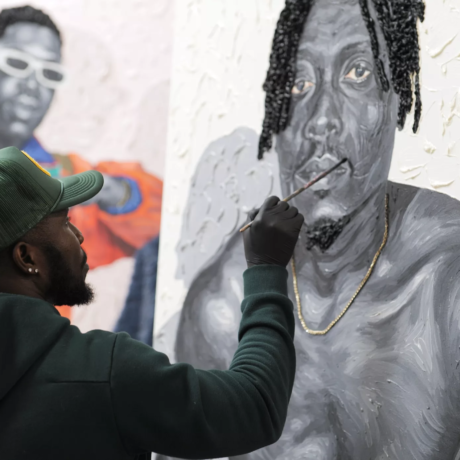
Since the devastating attack on Ukraine on 24 February, Vladimir Putin has pushed the Russian military further into the country, forcing civilians to either flee or shelter in place as the bombardment continues. Over half a million refugees have already left Ukraine, while men between the ages of 18 to 60 have been banned from leaving, and urged to fight by president Volodymyr Zelenskyy.
Footage has shown families sheltering underground, bombings of civilian buildings, and huge queues of people stranded in vehicles, or walking, as they attempt to cross Ukraine’s borders to safety. As international denouncements continue and with no de-escalation to the conflict in sight, we have brought together a number of resources to help better understand the situation, and what can be done to help.
1.
Support Ukrainian Media
You can support Ukrainian journalists on the ground and amplify their voices by getting your information directly from national media sources, some of which are in English. We recommend Kyiv Post, the Kyiv Independent, The New Voice of Ukraine and Ukraine World.
You can offer further support through a new campaign aiming to save independent Ukrainian media from being eradicated by war. A GoFundMe page set up by a senior executive from the Kyiv Independent has raised hundreds of thousands to help media operations continue from neighbouring countries.
2.
Fight Misinformation
Media and storytelling have always been powerful tools to advance political agenda, and misinformation is a huge part of warfare. Putin has been spreading a narrative that Ukraine was committing genocide in the Donbas. He also advanced a spurious ‘Denazification’ narrative to justify Russia’s attack on Ukraine.
These storylines are part of the huge propaganda campaign that has accompanied the invasion, including falsely referring to Russian troops “peacekeepers”. The strategy includes avoiding the words “war”, “invasion” or “attack”, when discussing the conflict.
Hence, when reading up about the conflict, proceed with caution—particularly on social media. Make a collection of trusted sources: @olgatokariuk is a verified independent correspondent working in Kyiv, regularly posting on social media from the ground.
@ChristopherJM is a Kyiv-based journalist fighting against Russian misinformation; @NikaMelkozerova is an award-winning journalist and executive editor of The New Voice of Ukraine, based in Kyiv; and @MannyMarotta who is covering the crisis from Poland.
3.
Educate Yourself
There are several podcasts, documentaries, and other sources that provide deep dives into the conflict and its background, offering alternatives to having the news channel constantly on loop.
Winter on fire: Ukraine’s fight for freedom is an Academy-award nominated documentary directed by Evgeny Afineevsky. Set during the civil unrest in 2013 and 2014, it gives an insight into what led to the Ukraine’s Revolution of Dignity against Russian influence. It is available on Netflix.
The Ukraine World podcast offers a helpful commentary on the conflict, particularly the episode “How Russia uses disinformation as an instrument of war”. It examines the role of propaganda in Putin’s war strategy.
4.
Take Action
March in support of the people of Ukraine. To keep updated on the upcoming protests in London, we recommend checking the Euromaidan London and Ukraine Solidarity Campaign Facebook pages.
You can also take action by writing to your local officials and urge them to support Ukrainians and push for more sanctions against Russia. For UK readers, you can find your MP’s contact details here, and template emails here.
5.
Donate
Donate to a local organisation providing aid on the ground.
Voice of Children is a Ukraine-based foundation providing psychological and psychosocial support to children affected by war.
Sunflower for Peace provides first aid backpacks for paramedics or doctors on the front lines.
United Help Ukraine is a non-profit helping those on the front lines and those who had to flee their home and are in need of temporary aid. They provide food, medical supplies to the displaced people of Ukraine.
You can also donate to global organisations that are fundraising for programmes in support of the people of Ukraine.
Choose Love donations will provide emergency medical care, food, shelter, clothing, legal support, support for the LGBTQIA+ community and mental health care.
Save the Children has a Ukraine Crisis Relief Fund which provides children and families with immediate aid.
Care International’s response aims to reach 4 million people with immediate aid and recovery, food, water, hygiene kits, psychosocial support, and cash assistance—prioritising women and girls, families and the elderly.
Assia Sabi is the media and communications manager at the International Rescue Committee (IRC), the global NGO focused on responding to the world’s worst humanitarian crises and helping people to survive and rebuild their lives
Sarah Boris is an artist and designer based in London





